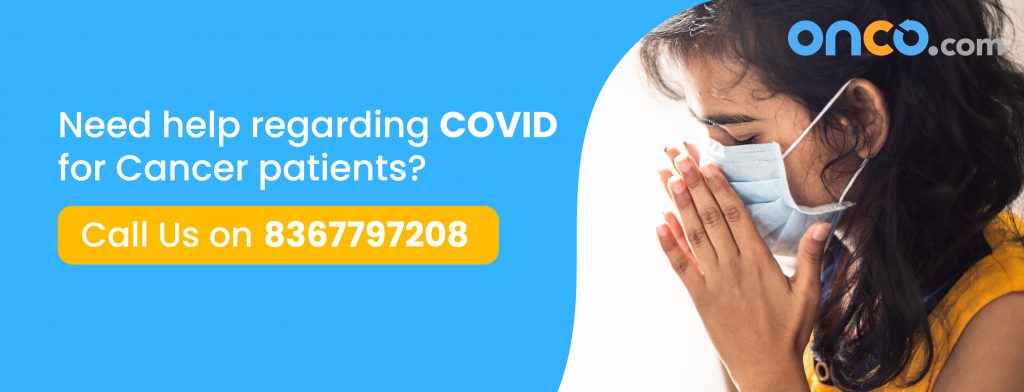Dr Suneel Kaushik Komanduri is a Consultant Surgical Oncologist at Balco Medical Centre, Vedanta Medical Research Foundation, in Raipur, Chhattisgarh. In this article, he discusses the impact of COVID-19 on treatment decisions in gastrointestinal cancer.
Overall precautions to be taken by gastrointestinal cancer patients undergoing treatment
The safety and management of cancer patients in the current SARS-CoV-2 outbreak are urgent. It is well established that cancer patients are more susceptible to infections because of the immunosuppressive state caused by both anticancer treatments and surgery.
A recent study from China shows that the risk of developing severe events in COVID-19 disease is statistically significantly higher in patients with cancer.
The COVID-19 pandemic has reached phase III in several countries worldwide. In India, the disease continues in phase II at present.
- The general precautions of social distancing and hand hygiene should be adhered by everyone.
- As per the available literature and experience, cancer patients may be at a higher risk of developing serious events if infected with COVID-19. Hence, you are advised to constantly use a face mask and avoid crowded places and gatherings.
- Patients on regular follow up post-treatment may reschedule their appointments or consult your oncologist through teleconsultation.
- Those receiving chemotherapy at a distant place may receive the same under medical oncologist’s guidance at a nearby satellite unit/centre.
- Maintaining a healthy balanced diet, physical activity, adequate blood sugar control, continuing other systemic medications for the coexisting disease are necessary.
- Be prepared for a delay in treatment in case of a widespread outbreak with excessive case load overwhelming the available health care resources.
Stage-wise Guidance for Gastric/Oesophageal Cancer Treatment during COVID-19
Oesophageal cancer
- Treatment for precancerous lesions like Barret’s Oesophagus may be deferred.
- Complete diagnostic and staging evaluation may be performed as per existing guidelines.
- Very early stage disease (T1a) amenable to endoscopic resection should preferentially undergo the same.
- cT1b diseases may be treated with surgery.
- cT2 and higher stage, node positive patients should be treated with neoadjuvant treatment (Chemoradiotherapy or chemotherapy). Surgery following neoadjuvant treatment may be deferred for 6-8weeks.
- Palliative radiation may be delivered in single fraction. Endoscopic procedures like dilation, stenting can be considered for relief of obstruction.
- Palliative chemotherapy can be considered for metastatic disease after discussing benefit vs risk in his /her case scenario.
Gastric Cancer and GE Junction Tumours
- Emergency surgeries: All emergency surgeries for Acute Obstruction and intestinal perforations, bleeding requiring transfusions will be considered during all phases of the pandemic.
- Complete diagnostic and staging evaluation may be performed as per existing guidelines.
- Very early stage disease (T1a) amenable to endoscopic resection should preferentially undergo the same.
- cT1b diseases may be treated with surgery.
- cT2 and higher stage, node positive patients should be treated with preoperative treatment (Chemoradiotherapy or chemotherapy) to downstage & decrease the disease burden and considered for surgery later. Surgery following neoadjuvant treatment in responding patients may be deferred for 4-6weeks.
- Those not responding well to neoadjuvant chemotherapy may undergo surgery early.
- Given the concerns of aerosolization of virus during laparoscopic procedures, oncologist may consider proceeding straight to preoperative treatment (Called neoadjuvant) without staging laparoscopy.
- Patients with gastric outlet obstruction or hemorrhage may be treated with endoscopic measures to allow for enteral nutrition/ control of bleeding and proceed to surgery if these measures fail.
- Surgery may be considered for short-term deferral in less biologically aggressive cancers, such as GIST, unless symptomatic or bleeding.
Stage-wise Guidance for Colon/Rectal Cancer Treatment during COVID-19
Colorectal cancer
- Emergency surgeries: All emergency surgeries for Acute Obstruction and intestinal perforations, bleeding requiring transfusions will be considered during all phases of the pandemic.
- Elective surgeries for polyposis syndromes, ulcerative colitis, colostomy reversal, less aggressive tumors may be deferred until the pandemic is controlled. They should be manged conservatively.
- All early stage colorectal cancers could be considered for surgery.
- All locally advanced resectable and unresectable cases should be considered for preoperative treatment for both colon (preoperative chemotherapy) and rectal (Neoadjuvant chemoradiation) cancers.
- Your doctor may strongly consider the use of short course pelvic radiation (5 fractions) as neoadjuvant treatment for locally advanced rectal cancer in appropriate cases. Latest evidence suggests it is safe, with improved tumor downstaging, to delay surgery of rectal cancer for 6-8weeks or longer and prevent surgery during COVID-19 outbreaks.
- With evidence of downstaging, surgery may be deferred until 12-16 weeks. Further additional systemic chemotherapy may be considered if additional delay in surgery is expected.
- For near obstructing lesions a stenting or radiation may be considered wherever possible.
- For resectable metastatic (advanced) colorectal cancers, continue effective chemotherapy and defer surgery. An upfront surgery approach may require utilisation of resources and increase health care burden.
- Palliative chemotherapy with targeted therapy can be considered for inoperable and metastatic colorectal cancers.
Is laparoscopic surgery a safer approach in this present scenario of COVID-19?
There are concerns on the safety to OT personnel due to laparoscopic/thoracoscopic procedures when employed in a COVID-19 positive or status unknown due to concerns about aerosolization of viral particles via the air used to insufflate the abdomen during the procedure. To date, no studies have identified SARS-CoV-2 in surgical smoke, and even if found, it is not known whether these viral particles are infectious.
Additionally, while viral RNA may be detected in the blood, no transmission of COVID-19 has been documented through this route. There is no compelling data to support the notion that respiratory or blood-borne infectious viruses are transmitted through the surgical plume or aerosolized laparoscopic gas.
However, there is widespread belief that aerosol generated during the procedure has the risk of virus transmission. Hence your oncologist may or may not consider it safer to proceed with laparoscopic surgery.
The benefits of reduced hospital stay, early recovery, reduced bed utilisation, less ICU utilisation , reduced respiratory complications are the benefits to the patient with laparoscopic /thoracoscopic procedures.
Can we proceed for adjuvant treatment with chemotherapy or radiotherapy after surgery?
All chemotherapy and radiotherapy considered with curative intent can be continued during the pandemic in a COVID-19 negative patient. All non-emergency procedures should be considered for postponement in COVID-19 positive patients.
Discuss with your oncologist the absolute benefit of addition of adjuvant treatment. Your doctor will weigh the incremental benefit of adjuvant chemotherapy with the risks of exposure to virus, bearing in mind the individual’s comorbidities and degree of fragility and then decide the need for and duration of treatment.
Alternative dosing schedules and oral therapies may be explored in appropriate situations. The options for alternative treatment schedules can be discussed with your doctor.
All due precautions for preventing transmission of disease should be adhered to during and after the session.
Precautions for Patients Undergoing Chemotherapy and Radiotherapy
- The general precautions of social distancing and hand hygiene should be adhered by everyone.
- You are advised to constantly use a face mask and avoid crowded places and gatherings maintaining social distancing is the key.
- Chemotherapy and radiotherapy may make you immunosuppressed. Please check with your oncologist on additional precautions required during those periods.
- Discuss with your oncologist the alternative options. Abbreviation of chemotherapy cycles, drug holiday (a break in chemotherapy cycles), dose reduction, a temporary changeover to an alternative less toxic regimen may be considered and discussed with your oncologist.
- Your oncologist may prefer to give you a shot of colony stimulating factor (Filgrastim) as a routine to reduce your risk of developing an immunosuppressed state due to low WBC counts.
- Discuss with your doctor about the feasibility of tele-consultation between chemotherapy cycles for any chemotherapy-induced side-effects to reduce hospital visits.
- Also, check with your doctor if the chemotherapy can be administered at a satellite centre nearby under his supervision. This will reduce your hospital visits and helps minimize exposure.
What are the risks of continuing treatment and risks of withholding treatment of gastric/Oesophageal cancers in present situation?
Gastric/Oesophageal carry a risk of progression if left untreated for 2weeks to 4weeks. Withholding or a delay in initiation of treatment may compromise the oncological outcomes. It is advised to undergo diagnostic and staging evaluation and appropriate treatment be initiated with adequate precautions adhered throughout the course of treatment.
What are the risks of continuing treatment and risks of withholding treatment of colon/rectal cancers in present situation?
Evidence from literature suggests a delay of 6-8 weeks or longer is safer considering surgery for rectal cancer without significantly effecting the oncological outcomes.
A delay in initiating treatment for colon cancer may result in disease progression, obstruction and affect the oncological outcomes. It may be advised that diagnostic evaluation be completed and treatment initiated. Surgery may be considered in early stages and neoadjuvant treatment may be considered in locally advanced cases.
All cancer patients and those on chemotherapy will be at higher risk of developing a severe disease if infected with COVID-19. Treatment-induced immunosuppressed status may increase the risk further. Hence all due precautions should be taken to prevent minimise exposure. Discuss with your doctor regarding the potential for progression of the disease and the risk of continuing treatment. Your doctor may consider less intense options if your risk is higher due to co-existing comorbidities.


